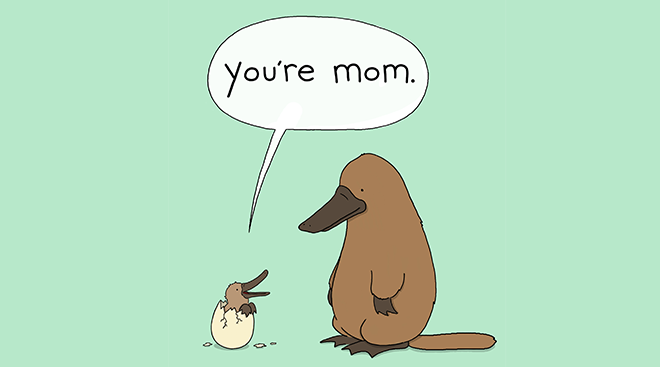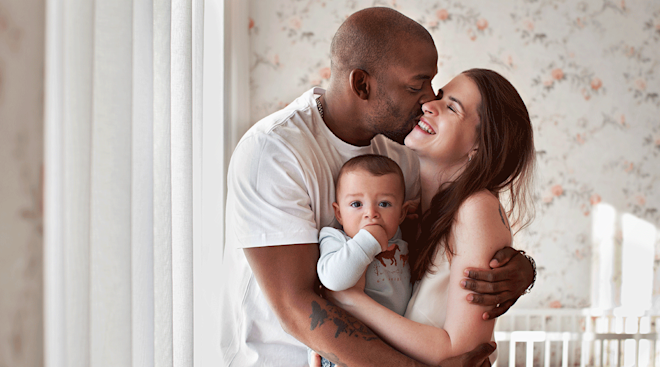The 5 Big Surprises in Store for Your Relationship After Baby Arrives
At some point in your relationship, you and your partner somehow figured out which household and life management tasks you’d each take care of, whether you had an explicit conversation about it or things just fell into place. You handle the grocery shopping and joint finances and they deal with laundry and car maintenance, or whatever your version looks like. It’s tempting for expectant parents to assume there’s no need to revisit that arrangement—but don’t be fooled. Having a baby is guaranteed to not only impact the time and energy you two have to tackle your typical chores, but it also brings on a slew of new responsibilities. (Who’s going to stock up on diapers? Do the middle-of-the-night soothings? Research when to stop swaddling?) When the balance of roles tips, feelings of resentment quickly build, and that can wreak havoc on your relationship.
“The number one thing that I was surprised by—and that the data also shows—is how surprised people are at the imbalance, the fatigue and the general toll that having a child takes on a relationship,” says Eve Rodsky, author of Fair Play, a book that examines the notion of all the unpaid, invisible work women do for their families and offers a new approach to dividing up chores and responsibilities. Stats reveal that in hetero cisgender relationships, men do five to 15 hours less work than women when a child is born, Rodsky says. Not only do new moms find themselves with more constraints on their time, but they’re staring down a massive to-do list on little to no sleep. It’s exhausting and unfair.
To help parents-to-be understand what’s in store for their relationship and how to equitably divvy up responsibilities before things get rocky, Rodsky breaks down the five biggest surprises that new moms and dads often face after bringing baby home.
Why do men do less work than women after becoming parents? A big reason is because we tend to see dads’ bandwidth through the lens of “time is money” but think of moms’ time as infinite. “We guard men’s time as diamonds and treat women’s time as sand,” Rodsky says.
She often hears women say they handle the majority of childcare because their husband makes more money and has to go back to work. Or, they chalk it up to the fact that women are “wired differently” and are better multitaskers than men. Another common refrain is that it’s faster to just do things themselves instead of taking the time to tell their partners what to do.
But Rodsky isn’t buying it. “These are what I call toxic time messages that we’re conditioned by society to give ourselves after a baby is born,” she says. “And we have to throw them out. Our time is equal to our partner’s time, and we get to decide how to spend our time.” She recounted a conversation with a leading neuroscientist who put things into perspective: “Imagine that we (men) could convince you (women) that you’re better at wiping asses and doing dishes—how great is that for my career? I get to just go back to the office or work out for two hours, while you stay home because ‘you’re better at it.’”
The key to avoid getting shunted or overburdened, Rodsky says, is to rethink the level of value you and your partner put on your time.
There’s a lot to think about when you’re a new parent. How long was baby’s last feeding? When is the next pediatrician’s appointment? Are we low on diapers? It’s no wonder we tend to live moment to moment when baby arrives. And while we can’t ignore the day-to-day decision-making that’s key to parenting, we also can’t afford to lose sight of the bigger picture.
What we need, Rodsky says, is to embrace long-term thinking with some “radical imagination.” Sit down and picture yourselves as a couple in 20 years. What do you want that relationship to look like? What is your long-term life plan? And most importantly, what will it take to get to that best version of yourselves? To make sure you don’t stray too far from that path, discuss up front what responsibilities each of you will take on, so one partner doesn’t become overworked, burned out and full of resentment.
Don’t put off this important conversation, thinking you’ll rebalance your loads later on. Moms often take on the lion’s share during maternity leave—after all, you’re taking that time to care for your child, right? The problem is that it’s easy to get swept up in short-term thinking, letting time slide by while resentment builds up. “Suddenly you wake up six months into baby’s life, and you’ve been so nose-to-the-grindstone that your relationship doesn’t look the way it used to,” Rodsky cautions.
New moms know a thing or two about identity loss. Before baby, you were a woman with a career, friends, interests and hobbies. Newborns have a way of consuming not only your time, energy and thoughts, but also your sense of self. It’s natural to feel somewhat adrift as you navigate your new role—but don’t forget that “you have a right to be interested in your own life!” Rodsky says. Motherhood doesn’t mean you have to abandon all of your other pursuits.
When Rodsky asked new parents what they’d do (other than housework) if they had an hour of free time, their answers generally fell into one of three buckets: Self-care (e.g., working out or going for a peaceful walk), friendships (e.g., watching the game with a friend or visiting your sister) and what Rodsky calls “unicorn space”—aka time to enjoy an interest outside of your role as a parent, partner or professional, like taking a hip hop class or painting.
But here’s the surprising thing: When she then asked new parents what they resented most about their partner, it was always for doing the things that made them happy. “He’s done a another marathon run,” or “she’s meeting with girlfriends for coffee again!” And that’s concerning. “It’s a terrible paradigm, not giving our partners the space and time they need to be interested in their own lives,” Rodsky says. It’s a two-way street: You have a right to pursue your passions, just as your partner should also feel like they’re allowed to do things for themselves. Work together to figure out how you can support each other in leading fulfilling lives.
Here’s a term you may not have heard of but will likely relate to: being the “she-fault”—aka having responsibilities constantly default to you. According to Rodsky, two-thirds of what it takes to run a home and family fall on women. But you shouldn’t always have to be the one to step up. Leaving things to default to moms is (gendered stereotypes aside) a result of partners not setting clear expectations up front.
“In the home, we’re dying of decision fatigue,” Rodsky says. “We’re deciding last-minute who’s washing the dishes, who’s going to feed the baby. That all requires communication.” Think about the workplace: When you take on a new role, you have a job description with clearly defined expectations. The same should be true for your role as a partner and parent, she argues.
When dividing up responsibilities, you can steal another concept from the workplace: identifying a Directly Responsible Individual (DRI). That person has complete ownership of a chore, from planning to execution, and every aspect of that task is their responsibility. So if you’re in charge of dealing with the garbage, you not only have to take out the trash when it’s full, but you have to make sure the garbage bins are pulled to the corner on trash pickup day, that the house is stocked with garbage bags and that a fresh bag goes back into the trash can after it’s emptied. And if something goes awry, it’s up to you to fix it. “When you don’t have a DRI, it often falls back on the woman,” Rodsky says.
Of course, it’s not always easy to figure out who should be in charge of what. That’s why Rodsky designed a deck of task cards that you and your partner can literally deal out. It’s a low-pressure way to approach the conversation of rebalancing your to-do lists.
When it comes to parenting, it’s unfair to expect moms to do everything. But it’s also pretty unproductive to assume both parents have to do everything together all the time. You don’t both have to go on that run to Costco or take the kids to the playground for the afternoon—that’s what Rodsky calls “doubling up.”
“There was a weird, intensive togetherness that I found in my interviews that I know is highly toxic,” she says. “Every time I’d dig into the reasons behind that intensive togetherness, it was because of guilt or shame, not because they love being with their family 24/7.”
Her point isn’t that you can’t ever do things as a family. If you and your partner want to take your kiddo to the swings together, by all means! But it’s also healthy to sometimes step away from your parenting role and carve out uninterrupted time for other things you love. Remember: Your time is valuable. Spending it wisely helps ward off resentment toward your partner, make space for you to follow your interests and avoid feeling like you’re constantly shouldering the brunt of parenting duties. Wins all around.
Navigate forward to interact with the calendar and select a date. Press the question mark key to get the keyboard shortcuts for changing dates.




















































